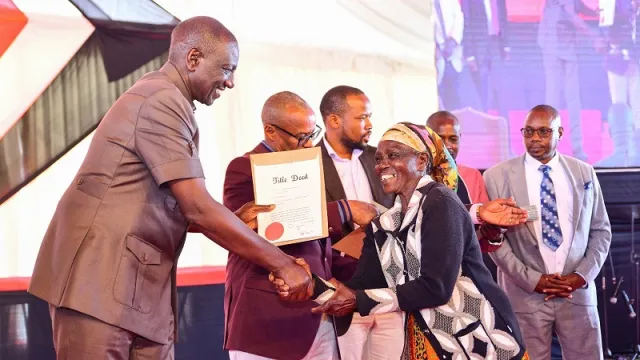Guarantee formal property rights to the poor and foster local investment

Guarantee formal property rights to the poor and foster local investment
In his lively and astute book, The Shackled Continent (Africa’s Past, Present and Future), Robert Guest opines that in most African countries informal economy is far larger than the formal one. The poor have assets - plenty of them. The failure to extend formal property rights to the bulk of the population is not a uniquely African problem. It is a feature of all poor countries like Kenya.
The president, Dr William Ruto, wanders rich-country capitals, World Bank and the International Monetary Fund begging for aid, investments, and loans. All the while, he fails to notice a much larger source of potential wealth at home. “In the midst of their own poorest neighborhoods and shanty towns,” writes Mr de Soto, “there are trillions of dollars, all ready to be put to use if only the mystery of how assets are transformed into live capital can be unraveled.” Unsurprisingly, aid and loans in Kenya, like many other countries, have proved futile.
Validity to owning land
Dignity comes with ownership. True ownership comes from possessing a valid and credible certificate of Title to land. Many landowners, currently, have no Title to their lands, instead, they are given land numbers by the survey. A land number is not a validity to owning land, it’s a Registry Index Map used by the Lands Survey to display all parcels of land within a specific area. This clearly brings out the fact that informal ownership of land is the norm in our country. Land without the Title deed is a dead letter.
Most slum dwellers, including Kibera area slum, stumble on millions they can’t use. A 2020 report released by The Standard estimates that the Bondeni area slum located in Nakuru could be sitting on a small gold mine and could be the expensive area in Nakuru City. This is backed by the fact that a small parcel of land measuring 100ft by 50ft costs between Kes10 Million to Kes15 Million.
However, an even smaller 80 by 50 plot would bring the owner sums ranging from Kes7 million to Kes10 Million. And yet, the landowners living on top of these big fortunes only have Allotment letters for the land. Most of them, being casual workers and hawkers, cannot afford to have their Title deeds processed.
Read also: China’s TikTok faces ban in Kenya after live protest coverage
Robbed Economy
Apparently, a 2017 report released by the World Bank says that lack of title deeds for Nairobi’s Kibera slum residents could be costing the economy up to Kes103 billion. The bank says the tiny clique of faceless investors, who have built shacks for Kibera’s estimates 250,000 residents, are making a kill from the slum dwellers through rent and other service charges at expense of the biggest economic benefit, which would be derived if the land was Titled and had permanent building on it.
“The land is owned by the government but managed by slumlords and political elite who control the land and have no interest in redevelopment (because they do not own the land), which would take away their very profitable slum business,” the World Bank says in the report. Fact is 90 percent of the slum dwellers are tenants of the shacks, the average size of which is 12 feet square, costing as low as Kes700 monthly.
Title deed registration
Few weeks ago, while addressing the residents of Isiolo, the president assured the country that his administration will fasten processing and issuance of Title deeds. However, he failed to address the reduction of the sum amount charged through the whole process of acquiring a Title deed. Regrettably, the poor ‘hustlers’ cannot afford Title deed registration fees charged at the land registry when submitting documents for obtaining a Title deed. In fact, the registration fee is Ksh 500 and the booking form to fill is issued by the officer.
Additionally, information from the form will be used in printing the Title deed and thereafter a sum of Ksh 5000 is charged for the certificate to be issued. The poor can only dream of having this total sum of Ksh 5500 to put food on the table and keep their children through school than having to pay this amount for the Title deed.
What the law provides
The Constitution of Kenya 2010 under Chapter Five, Land and Environment, Article 60 Sub-article 1, Principles of land policy, stipulates that land in Kenya shall be held, used and managed in a manner that is equitable, efficient, productive and sustainable.
More importantly, the executive summary penned on the Sessional Paper No. 3 of 2009 on National Land Policy provides that the framers’ aim, through a widely consultative process, is producing a policy whose vision is “To guide the country towards efficient, sustainable and equitable use of land for prosperity and posterity”.
Therefore, providing Title deeds to the poor brings upon implementation of all these provisions. Nevertheless, in a country where households and/or land-owners and businesses need collateral to secure credit, Title deeds offer a major form of security that banks and micro-lenders can use to issue loans which they, the poor, can use to initiate life changing projects.
What needs to be done?
The government should consider establishing National Titling Programme desks to all Huduma Centers in the country. The programme will work hand-in-hand with the Ministry of Lands and National Land Commission in collecting data and processing of land Titles.
Moreover, the programme will ensure the process is less timely and costly where the poor can afford to have their Title deed processed. In doing so, Vision 2030 will not only be characterized by local investments but will also be fully realized in due time.
The author Kithinji Nturibi is a law student at Mount Kenya University. Email: [email protected]



